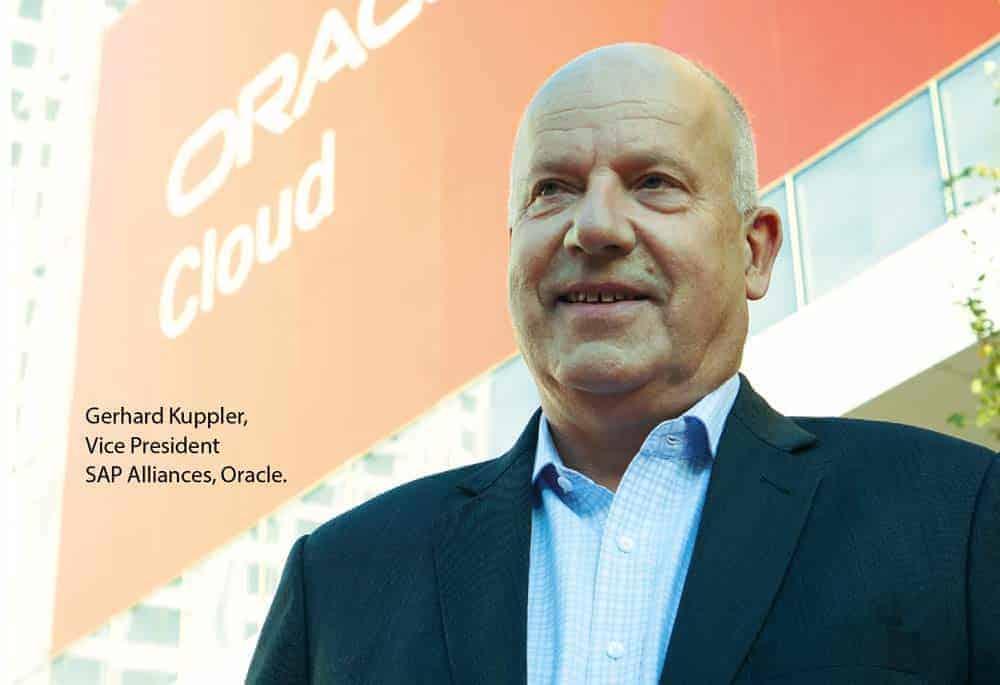Interview: Beyond 2025


Gottfried Welz, E-3: How would you characterize the current collaboration with SAP?
Gerhard Kuppler: We have been working with SAP for over 30 years and still have tens of thousands of joint customers. Among them very large customers. Among them customers with the largest SAP systems in the world.
And our cooperation has always been determined by the requirements of our common customer base. We on the Oracle side have always conducted our cooperation in a serious, responsible and stable manner and will continue to do so.
We assume that customers using Business Suite or the NetWeaver stack will be securely on the road by 2025 - as communicated by SAP.
Likewise, we assume that SAP will take a responsible position beyond this, particularly with regard to large corporations. We see it as very likely that large SAP customers will be using Business Suite or SAP Classic by 2030 or 2035.
E-3: There are still quite a few SAP legacy customers using Oracle products, especially Oracle Database for SAP in conjunction with SAP Classic or NetWeaver-based applications. What is their perspective for their Oracle SAP deployment for the next years, for example until 2025?
Coupler: Primarily, SAP has to answer this question! First and foremost, it is about SAP applications and SAP customers. We see that customers have made 10,000 or more modifications to their SAP systems.
They cannot quickly transfer these modifications one-to-one to a new environment or use them without transformation efforts. We are currently convinced that customers will motivate SAP to provide support well beyond 2025.
E-3: What if Oracle simply pulled the plug on SAP?
Coupler: This question does not arise. Both companies are major players in the market. It is very unrealistic for them to abdicate their responsibility.
E-3: Customers complain here and there about high Oracle license costs. Also with regard to the VMs used in connection with the SAP application. Why is Oracle not more agile or flexible here?
Coupler: When customers approach Oracle sales or have discussions with them, there are usually reasonable solutions at the end. On the other hand, there are always price discussions.
Regardless: You have to see the value of Oracle solutions for SAP customers. And that is very high. Otherwise, Oracle's market share in the SAP environment would certainly be lower.
Less expensive database offerings have always existed. SAP customers who buy Oracle appreciate the value Oracle offers in terms of stability, security and scalability for their SAP infrastructures.
E-3: SAP has been using Java or a Java variant for years. What is the next step in Oracle-SAP partnering?
Coupler: SAP would first have to be asked about this. The fact is that there are long-term agreements between SAP and Oracle on Java.
E-3: In the fall of 2017, Oracle surprised everyone by announcing that SAP would run in the Oracle Cloud - and with SAP's certification blessing. What was the reason for Oracle to create opportunities for SAP-Oracle Cloud Infrastructure use?
Coupler: SAP has decided to certify Oracle Cloud Infrastructure. It is part of the agreements that exist with SAP in the long term. The goal is for us to offer SAP Business Suite customers the opportunity to use Oracle Cloud Infrastructure (OCI).
The necessary certification requirements from SAP have been met. Customers benefit, for example, from Exadata Cloud Services, which they can use via Oracle Cloud Infrastructure. Or from Oracle Bare Metal in the OCI as well as from Bare Metal as virtualized systems.
Further announcements regarding Oracle Cloud will follow. We want to ensure that customers who use Oracle can operate their IT both on-premise and off-premise. This is of particular interest to customers who also use SAP in addition to other Oracle applications or Oracle solutions.
E-3: How is this cloud offering being received by Oracle SAP customers?
Coupler: SAP customers are showing great interest in OCI. And there are customers, too. Practically whenever a hardware refresh becomes necessary for SAP-Oracle customers, Oracle Cloud Infrastructure comes into play and represents a proven alternative to an on-premise hardware replacement.
Customers who also rely on high-performance infrastructure can benefit in many ways from Oracle Exadata Cloud Services.
E-3: And what about Hana? Could Hana or Hana-based applications also run in the Oracle Cloud at some point?
Coupler: The decision on this lies with SAP.
E-3: During Oracle Open World 2018, the general availability of Oracle's "Autonomous Database (18c)" was announced. Will this Oracle Database version also be made available to SAP customers?
Coupler: There are considerations to make selected functions of the Autonomous Database available for SAP customers. Which these will be and when they will be available, there is currently no definitive decision.








